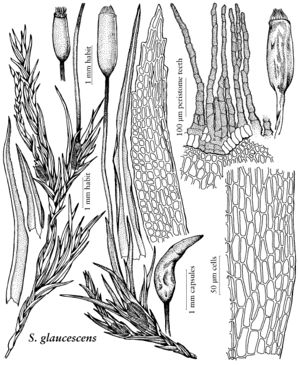Difference between revisions of "Saelania glaucescens"
in J. O. Bomansson and V. F. Brotherus, Herb. Mus. Fenn., Musci, 53. 1894,.
FNA>Volume Importer |
imported>Volume Importer |
||
| (6 intermediate revisions by 2 users not shown) | |||
| Line 1: | Line 1: | ||
{{Treatment/ID | {{Treatment/ID | ||
|accepted_name=Saelania glaucescens | |accepted_name=Saelania glaucescens | ||
| − | |accepted_authority=(Hedwig) | + | |accepted_authority=(Hedwig) Brotherus |
|publications={{Treatment/Publication | |publications={{Treatment/Publication | ||
|title=in J. O. Bomansson and V. F. Brotherus, Herb. Mus. Fenn., Musci, | |title=in J. O. Bomansson and V. F. Brotherus, Herb. Mus. Fenn., Musci, | ||
|place=53. 1894, | |place=53. 1894, | ||
}} | }} | ||
| − | |basionyms={{Treatment/ID/ | + | |basionyms={{Treatment/ID/Basionym |
|name=Trichostomum glaucescens | |name=Trichostomum glaucescens | ||
|authority=Hedwig | |authority=Hedwig | ||
| + | |rank=species | ||
| + | |publication_title=Sp. Musc. Frond., | ||
| + | |publication_place=112. 1801 | ||
}} | }} | ||
|synonyms= | |synonyms= | ||
| Line 34: | Line 37: | ||
-->{{#Taxon: | -->{{#Taxon: | ||
name=Saelania glaucescens | name=Saelania glaucescens | ||
| − | + | |authority=(Hedwig) Brotherus | |
| − | |authority=(Hedwig) | ||
|rank=species | |rank=species | ||
|parent rank=genus | |parent rank=genus | ||
| Line 49: | Line 51: | ||
|publication year= | |publication year= | ||
|special status= | |special status= | ||
| − | |source xml=https:// | + | |source xml=https://bitbucket.org/aafc-mbb/fna-data-curation/src/2e0870ddd59836b60bcf96646a41e87ea5a5943a/coarse_grained_fna_xml/V27/V27_663.xml |
|genus=Saelania | |genus=Saelania | ||
|species=Saelania glaucescens | |species=Saelania glaucescens | ||
Latest revision as of 21:27, 5 November 2020
Leaves 1–2.5(–3.5) mm, proximal leaves small, the distal and perichaetial leaves gradually acuminate, ± subulate from a lanceolate base; costa with a single row of guide cells, and both adaxial and abaxial stereid bands, or adaxial stereid band sometimes weak or rarely absent; lamina cells often irregularly 2-stratose towards the apex and occasionally elsewhere. Seta to 15 mm. Capsule with operculum to 1 mm. Spores 15–20(–22) µm, greenish to yellow-brown.
Phenology: Capsules mature early summer–late fall.
Habitat: Soil on steep banks, particularly those protected by overhangs, frequent on roadsides, soil in sheltered rock crevices
Elevation: moderate to high elevations
Distribution
Greenland, Alta., B.C., Man., N.B., Nfld. and Labr. (Nfld.), N.S., Ont., Que., Yukon, Alaska, Ariz., Colo., Iowa, Mich., Minn., Nebr., N.J., N.Y., n Eurasia, e Asia, s Africa, Pacific Islands (Hawaii, New Zealand).
Discussion
The whitish to bluish coloration of the leaves is characteristic. Often thought to have been fungal or cyanobacterial in origin, the granular or thread-like surface material responsible for the glaucous coloration is a diterpene.
Selected References
None.
